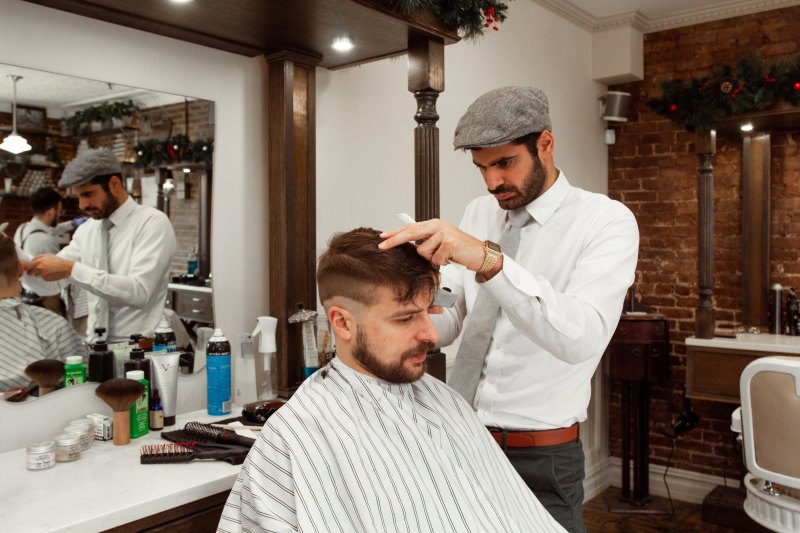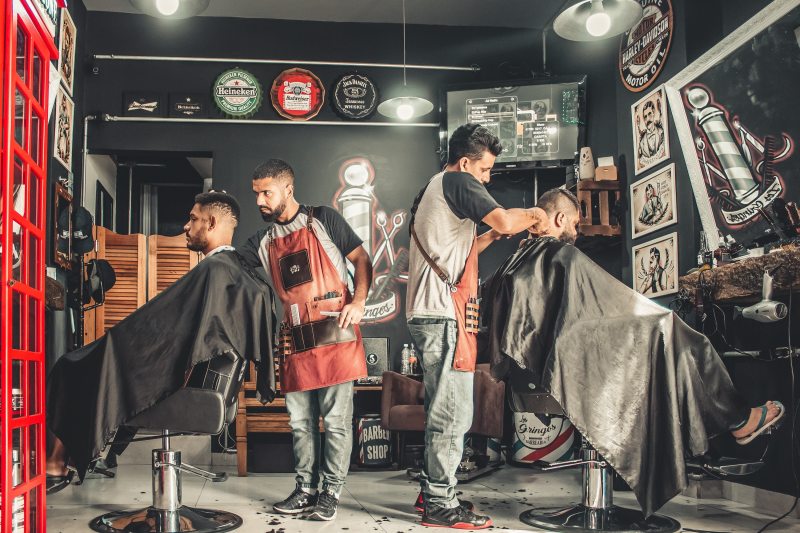
It’s the question your barber asks every time, but you never know how to answer: “What do you want this time?” Reading “men’s haircut” off of their services list isn’t enough — you need to come to your appointment at least semi-prepared. There are plenty of men’s hairstyles out there, and getting a haircut isn’t as simple as it once used to be. Sure, there are ways to fix a bad haircut, but isn’t it better to get it right the first time?
If you’re ever not sure what to tell your barber what you want in a haircut, this guide will point you in the right direction and have you leaving the salon feeling and looking your best. To help you out, we talked to a group of stylists who have been in the hair care business for decades to figure out what exactly you should be telling your barber next time you’re in the shop.

Conversation is key
Sitting in the chair can be a bit awkward — especially your first few times with a new barber.
Master stylist and salon founder Yvey Valcin has worked Paris, Milan, and New York Fashion Weeks. He recommends meeting and having a conversation with a potential new barber before they ever touch your hair.
“In my experience, it can be nerve-wracking to be in a new stylist or barber’s chair for the first time,” he says. “The better they get to know you, the more able they are to craft and tailor a cut and style to you specifically.”
Getting an idea of their work beforehand will make sure you’re going to the barber that’s right for you. If you have curly hair, dyed hair, or hair that just needs a little TLC, you want to make sure your barber has experience working with what’s growing out of your head. Take a look at their social profiles or other clientele in the shop. Talk openly to your barber about what you’re looking for and what might look best for someone with your hair type.
Clear minds, clear cuts
Before showing up to your appointment, have a clear idea of what you’re hoping to get out of it. You don’t need to have all the answers up front, but having a general understanding of what you’re looking for makes for an easier experience for both you and your barber.
Darrius Peace has been a Master Barber and hairstylist for over 20 years. “The first thing to tell their barber is exactly how much hair they want to cut,” he tells us. “It is very important to be very vocal about this matter, as once the hair is gone, it’s gone.”
Traditionally barbers work in inches, so make a rough estimate of how much you want trimmed off the top. Half an inch to an inch is pretty standard for short men’s hairstyles. Guys with longer hair may want to take off two inches or more.
“If you choose to wear dense, heavy, or longer hair, it’s best to inform them that you prefer not having your line pushed back,” says Peace.
Your hair frames your face, so you want to have a lineup that is complementary to both your face shape and hairstyle. The same goes for your facial hair — if you typically wear it a certain way, be sure to let your barber know so they can fine-tune your hair to fit your style. Peace says, “If you’d like to wear your beard or mustache heavy, it’s important to clearly state these requests.”
Picture this
It may seem elementary, but every stylist we talked to suggested bringing photos to show your barber.
“Pictures say a thousand words,” says Jessica Walker, President of J Walker Salon Group, “I always like to go back and ask the clients if they have a photo of themselves when they really loved their hair — what did they love about it?”
Having a reference photo, particularly one of yourself, is a big help to barbers who use a visual aid to work their magic. Go beyond just searching for ‘haircut for men’ online. Take a look at your own camera roll and find something on you that you actually like. Every guy has different hair — texture, weight, oiliness — so not all styles will work on everyone.

Question…?
If you have any specific questions to ask your barber, take as much time as you need in the beginning to talk.
“Be sure to ask open-ended questions; this allows you to see how well-rounded and knowledgeable they are about current trends and what’s best for your hair,” says Valcin. “Ideally, a good stylist will ask you questions in return to get more clarity on what you want and who you are as well.”
This is also a good time to bring up any personal haircare issues you might have.
Alexia Donovan, director of client services at Barber Surgeons Guild, says you should bring up issues like thinning hair if that’s a concern: “Feel comfortable speaking to your barber as they can creatively cut and style to help conceal areas of concern.”
Scalp care is a major part of hair care, too. “The barber should know,” Peace says, “if you’re someone who deals with excessively dry, itchy, scalp, any form of dermatitis, any form of psoriasis, or any form of skin or scalp inflammation.” If any of these conditions affect you, make sure to let your barber know during your consultation or before your haircut.



